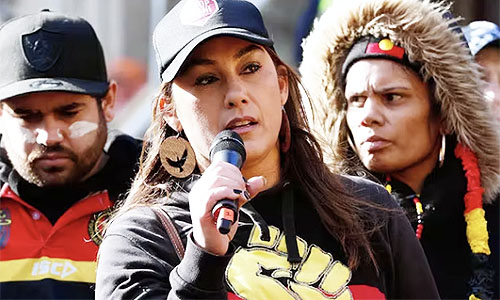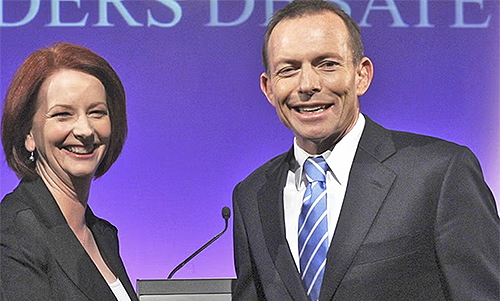
by DANIEL Y TENG – EXPATRIATES from the former communist State of Albania have warned that the Voice debate sounded “eerily similar” to their ex-homeland’s political rhetoric.
“As soon as we heard from Prime Minister Anthony Albanese about the Voice, we got flashbacks to our lives under socialism in our country of origin,” said Dr Zekri Palushi in an interview with The Epoch Times.

- The Voice campaign has effectively mixed rhetoric from the Marxist playbook.
- Communists have a long track record of using victimhood to achieve their goals.
- It’s easy to love communism while living in America and Australia. Let them try living with it to see how it really is.
“As soon as we heard from Prime Minister Anthony Albanese about the Voice, we got flashbacks to our lives under socialism in our country of origin,” said Dr Zekri Palushi in an interview with The Epoch Times.
“The class system was implemented in order to incite Albanian citizens to hate and fight against each other, and I must admit that the strategy worked very well for the Albanian Communist Party,” he said.
AGENDA
“They managed to keep the people divided while the Party worked together further pushing their agenda,” he said.
“That’s why we see the Voice not as a gesture of kindness but as a Marxist movement with specific goals that, if successful, will see the good Aboriginal people become the greatest losers.”
Dr Zekri and his wife, Tina, were attending a symposium on the Voice in Brisbane organised by the Samuel Griffith Society on May 17.
The Palushis grew up in Albania’s communist era before migrating to Australia in 1995 due to safety concerns.
Dr Zekri was a top cardiologist in Albania but earned the equivalent of A$9.80 a month.
Under the Communist Party of Albania, the small Eastern European country – of just three million people – suffered tremendous economic damage and food shortages, leaving many to die from malnutrition, while those with the means fled to the West.
The communist leadership – ruled by dictator Enver Hoxha – also implemented brutal persecution of dissidents, which saw the State build an estimated 39 jails and 70 forced-labour camps.
Tens of thousands of people died with more than 6000 believed to have perished in custody. Most of their bodies were never recovered or were simply disposed of hastily in rivers or buried in makeshift graves.
Dr. Zekri’s grandfather was tortured and murdered for dissent.
Later this year, Australians will go to the polls to vote on whether to alter their Constitution to include a near-permanent Indigenous advisory body.
Its 24 members will be voted for by Aboriginal and Torres Strait Islanders only and will have the power to make “representations” to the parliament, the executive and the wider public service.
The hope of Voice advocates is that having this extra layer of representation in government will help deal with chronic problems within Indigenous communities, including unemployment, domestic violence, alcoholism, youth crime and welfare dependency.
EERIE
Yet Tina Palushi says public discourse around The Indigenous Voice to Parliament has eerie similarities to that of communist Albania.
“In Albania, there were two groups, those who liked communism and those against it – non-communists. That created lots of division and problems – my grandfather was killed by communists just for his ideas,” she said.
“He loved Jesus and was a very religious person. They asked him to denounce, and he said, ‘I don’t like communism if they don’t let us practice the religion’.
“That’s all it took for him to be killed and for my whole family to be stamped as ‘anti-communist’.
“Since I was in grade two, I faced this discrimination,” she added.
“What was done to Aboriginal people [during the colonial era] was completely wrong and should be condemned. But what fault have I got now coming from another country to contribute to Australia?”
Tina also took issue with the Labor government’s lack of detail over the nuts and bolts of the Voice and how it will actually operate.
“The government is not explaining anything about the Voice, just saying, ‘Oh, we’ll explain later, you’ll have to just vote Yes”.
“If you don’t vote Yes, you’re marked as a racist or not caring – which is completely wrong,” Tina added.
“So that’s the same thing the Communist Party of Albania did, ‘I’m telling you to do this, you just have to say yes and vote for it’.”
Prime Minister Albanese has been repeatedly criticised by Opposition Leader Peter Dutton for not providing enough detail on the extent of the power of the Voice and what limitations will be placed on it.
“I’ve spent literally months, like many Australians, trying to understand what it is the Prime Minister is proposing. We can’t get the basic detail out of him, and I think that is a deliberate strategy,” Mr Dutton said last month.
Mr Albanese, however, said Mr Dutton was simply attempting to stall support for the Voice.
“No matter how much detail is put out, Peter Dutton will say, ‘Oh, what about more detail?’ That’s the game that’s being played here,” the PM said.
CONCERNS
Meanwhile, former High Court Justice Ian Callinan shared similar concerns with the Palushis about the rhetoric around the Voice.
“There’s a nasty feel about this,” he told attendees of the symposium. “But in addition to the nastiness, there’s a kind of presumptuousness, condescension, [and] a paternalism.”
“All of you and I have been told by the Yes side that we must vote ‘Yes’,” he added.
“What surprises me is that companies, law societies and bar associations are telling their members how they should vote,” he said.
Fellow speaker Warren Mundine said four similar models to the Voice were tried in the past and all had failed.
Eventually, Indigenous people simply stopped voting for candidates for the Aboriginal and Torres Strait Islander Commission.
Gary Johns, a former Labor minister, warned that an additional layer of government bureaucracy would likely be a boon for lobby groups and more political horse-trading.
Johns added there was a need to overcome the emotional arguments of the Yes proponents of the Voice, which was appealing to younger generations.
Eric Louw, an expert on affirmative action policies in South Africa, said the Voice campaign effectively mixed rhetoric from past Marxists.
“The Voice seems to be primarily the outcome of liberal ‘white guilt,’ but this guilt is now mixed with the discourse around victimhood,” he told The Epoch Times.
“Marxists have a long track record of using victimhood. Early Marxists told workers they were victims and they should be angry at capitalists,” said the former member of Nelson Mandela’s African National Congress.
Louw said that nowadays, the theory had “mutated” to include a broader range of “victims”, resulting in movements like Black Lives Matter, as well as campaigns against colonialism and Indigenous oppression.
ACTIVISTS
“The Voice taps into all three of these fashionable ideologies,” Louw added. “It does not make ‘Yes’ activists ‘Marxists’, but they are heavily influenced by neo-Marxism, even if they don’t realise it.”
Meanwhile, the Palushis said many in the West simply had no real on-the-ground experience living under socialist and communist regimes.
“It is easy to love socialism and communism while living in America and Australia. Let them try living with it to see how it really is,” Tina said.
Dr Zekri said those in the West could not be blamed because education systems were now teaching socialist, Left-leaning ideologies.
“Sixty per cent of my patients favour socialism … they really do not believe me when I tell them the stories,” he said.
“But we pray that the Australian people never really try this system and that the Voice does not succeed for the benefit of the country.”PC











” December 1, 2019 Lucas Rosas
Marcia Langton used to be a leader in multiple Marxist groups yet now she gets invited to advise government on Aboriginal policy. Is she still a Marxist?
Is Marcia Langton a Marxist? She certainly used to be.
Marcia Langton is a very prominent aboriginal activist and academic. So prominent, in fact, that when the Liberal Minister for Indigenous Australians Ken Wyatt was creating his senior advisory group to design an “Indigenous Voice” to Government, he made Marcia Langton co-chair.
This is interesting, since Marcia started her political career as a hard-core Communist and has never disavowed her past views. She wasn’t simply a naïve young activist, either. Langton was a member of the National Committee of the Communist League (CL), a Trotskyist group that campaigned for the violent overthrow of the Australian government and the implementation of a totalitarian socialist state.”
“Albanese attended St Joseph’s Primary School in Camperdown[26] and then St Mary’s Cathedral College. After finishing school, he worked for the Commonwealth Bank for two years before studying economics at the University of Sydney. There, he became involved in student politics and was elected to the Students’ Representative Council. It was also there where he started his rise as a key player in the ALP’s Labor Left. During his time in student politics, Albanese led a group within Young Labor that was aligned with the left faction’s Hard Left, which maintained “links with broader left-wing groups, such as the Communist Party of Australia, People for Nuclear Disarmament and the African National Congress”.
Albo is a follower of the late Russian Revolutionary Marxist Leon Trotsky.